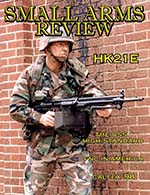SITREP: December 1998
By Dan Shea
Another tale of woe has come across my desk. One more United States citizen whose Chief Law Enforcement Officer (CLEO) refuses to sign off on the back side of the Form 4 for him to purchase a Title II firearm. In conversations with this Ohio resident, he intimated that the Bureau of Alcohol, Tobacco, and Firearms agents in his area had gone to all of the potential signers of Form 4’s, and informed them that they were not required to sign, and the government would prefer that they didn’t do it. I do not have names and dates for all of this, these are only rumors and allegations. However, it is a story that is very familiar to many of us in the Class 3 business.
This amounts to de facto gun control. It’s bad enough when the CLEO keeps a record of your firearms, let alone keeping you from having them.
Originally, the Law Enforcement signature was intended to verify that the signature, photograph, and fingerprint cards were those of the applicant trying to get a Form approved for a National Firearms Act taxed and registered firearm. Over time, it has become a place to try to get “Approval” from the local Chief of Police. He is being asked to perform work related to federal tax collection.
Recently the Supreme Court heard arguments in the “Brady Bill” case, and ruled that the federal government could not require the local or state officials to do work around a federal statute. Brady went out the window if the local Chief didn’t want to do the “Required” background check of a handgun purchaser. Most of this was related to the labor burden being unjustly imposed on the local government, not with the Constitutionality of Brady.
In the same way, the federal government can not require a state or local official to sign off on your Form 1, 4, or 5. Since they can not require it, I do not see how they can deny your application for a transfer if the CLEO refuses to sign.
I am just stirring the pot here, friends. There is no reason in the world for a law abiding United States citizen who has not surrendered his rights, to not be able to own a Title II firearm. Dealers and Manufacturers could make a case for the federal government interfering with their ability to do business- but there is nothing new about that.
We at SAR are interested in your perspective as Title II firearms owners, or people who are desiring to own, and would like your input on this situation.
- Dan Shea
This article first appeared in Small Arms Review V2N3 (December 1998) |
| SUBSCRIBER COMMENT AREA |
Comments have not been generated for this article.



